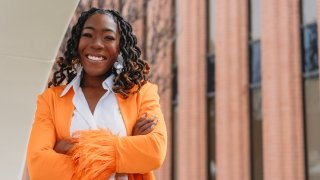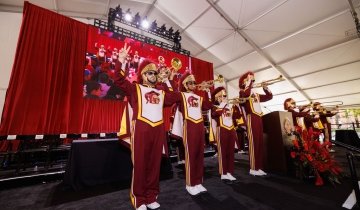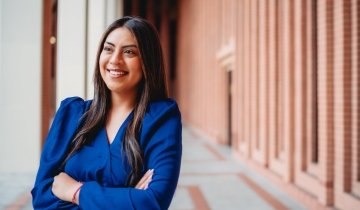From attending the storied Howard University to USC Rossier, Tiffaney D. Robinson knew education was her passion. Originally from Prince George’s County, Md., she graduates later this week from USC Rossier’s Master of Education in School Counseling online program and is the 2023 Commencement student speaker.
“When I was at Howard I wanted to initially go the legal route with education,” Robinson said. While pursuing a bachelors in legal communications/administration of justice, she worked with the nonprofit Girls Inc., where Robinson discovered her passion working with children. Her goals shifted after graduation and Robinson was hired to teach science at a private middle school in Maryland. Her creativity, interest to further her education and drive to be an agent for change led Robinson to California, where she took the California Basic Educational Skills Test (CBEST) and continued teaching. After four years writing curriculum, Robinson realized just how much work needed to be done regarding education policy, which prepared her for the next move.
It’s the heart that matters
“I wanted to learn more about the holistic child,” she added. “That’s what brought me to USC.” At this time in her life, Robinson is more concerned with the heart of the child. Helping students become the best version of themselves was key, and she knew that counseling was part of her journey.
“When I was researching counseling courses, I realized a lot of the research is also a little outdated,” she added. “Somebody has to add to the research that we need.”
What supported Robinson’s decision to attend USC Rossier was working with alumna Christiana Cobb-Dozier ’20 SC online at Resolute Academy Charter School in Los Angeles. Cobb-Dozier is also a member of the program’s first cohort. USC Rossier’s focus on diversity, equity and inclusion was important to Robinson especially with the populations that she was working with and wanted to research. The school’s diverse student demographic and professors with their wide range of knowledge was valuable to her. “That was important to me, and that’s something I know USC stands for,” she said. “I wanted my education to align with what I’m passionate about." USC checked this box for her.
Two additional factors confirmed Robinson’s decision to attend USC Rossier: family and flexibility. Her undergraduate university strongly emphasized that sense of family. “Oh, you went to Howard. Now, we’re family,” she said when people recognized her undergraduate university. “That’s what USC feels like to me, and I enjoy that.”
USC Rossier’s online master’s program also offered Robinson the flexibility to attend class and work at the same time. Currently, Robinson mentors and educates youth through the non-profit organization Sharefest Community Development in San Pedro, Calif.
Holistic approach to counseling
Robinson has seen the role of the counselor evolve from academic advising to a more holistic approach. “I think that in order for us to help kids get to the next place, especially during COVID, I realized how important it is for us to focus on that social-emotional aspect.” Students who were home during COVID-19 pandemic often confronted issues on their own. Robinson saw how much that was taken for granted, and counseling allowed her to be there for students in an academic as well as an emotional-support way. Pursuing an advanced degree in counseling offered her the tools to manage those situations. “For me, counseling was exactly where I should be in education,” she added. “The more I learned about it, the more it solidified that for me.”
“Counseling taught me to see the privilege in every single population, every single culture,” Robinson said. While she found autonomy through her online classes, Robinson was still able to connect with her cohort. The collaborative environment where fellow classmates shared experiences, communities, cultures, religious beliefs and sexual identity was eye-opening for Robinson. “We’re not afraid to have those tough conversations. USC does not shy away from that in any aspect. We embrace it,” she said.
Robinson felt that her HBCU undergrad provided the foundation, while USC Rossier showed her the next path. “One of our roles as a counselor in general is to be there and be an advocate for anybody,” she added. “When you have a school like USC, you can be in the space where you feel free to explore that.”
For prospective students and expressing gratitude
Robinson offered advice for the incoming class and students interested in pursuing an advanced degree with USC Rossier. “Be open to learning a lot more about yourself and about your biases,” she shared. “Acknowledging them doesn’t make you less of a person, and it actually makes you a stronger individual.”
Regarding the rigorous program workload, she suggested digesting and applying what is learned. While students may feel the need to rush, students should take in the experience. “Don’t be hard on yourself, but hold yourself accountable and use all the resources,” Robinson said.
She acknowledged that every prospective student’s experience is different, but encouraged students to take that leap. “I would tell them to apply immediately,” she said. “Five years ago, no one could have ever told me I was going back to school, and now I want to pursue my PhD.”
Robinson attributes her success to her close connection to her undergraduate service organization Delta Sigma Theta and her mother. “I love my mom, that’s the biggest thing,” she said. “Our relationship is really special to me. She’s my best friend; who I am is because of her.”




